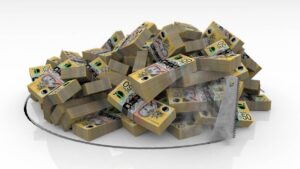From stocks to cryptos, here’s a quick day trader’s guide to capital gains tax

Picture Getty Images
Many find tax boring, but it can land you in hot water with the ATO if you’re not filing them correctly.
As a stock trader, there are specific things that you need to be extra careful about, especially as the ATO has announced it will be cracking down on certain things this year.
Work-related expenses, rental properties, and capital gains from stocks, property, and cryptos are high on the ATO’s watch list.
This article is meant as a quick freshener for day traders (as opposed to investors), and by no means should it be used as tax advice.
Readers are encouraged to consult qualified and registered tax accountants to file their personal tax returns.
Trader vs Investor
How you get taxed on capital gains will depend on whether you’re classified as a ‘trader’ or ‘investor’.
There are no black and white rules around this, but the government has provided some guidelines as a means of assessment.
The ATO defines a stock investor as a person who holds shares for the purpose of earning income from dividends.
A stock (day) trader, meanwhile, has been defined as a person who carries out business-like activities for the purpose of earning income from buying and selling shares.
What this means is that day traders are treated almost like sole proprietors who carry out a business, which comes with notable benefits that we’ll discuss later.
To clarify this matter, Stockhead spoke with Caxton Pang, a managing director and tax advisor at Linton Advisory Group, who told us that the frequency of trading is a good test.
“The ATO will likely classify you as a trader if you buy and sell shares frequently on a regular basis, with the intention of making a profit,” Pang told Stockhead.
Pang said that along with frequency, the ATO also looks at other trading behaviours such as volume, regularity, and your record keeping to decide if you’re a trader (and not an investor) for tax purposes.
Tax advantages of being a trader
If you’re classified as a stock trader, you can claim many of the the tax benefits that businesses enjoy.
For one, any expenses you incur in carrying out your trading activities become allowable deductions against your overall taxable income.
This could include costs such as the use of office, stationery, consumables, computer, phone and internet, along with depreciations which can be claimed on items over $300.
Another benefit from being a stock trader (as opposed to an investor) is that you’re allowed to offset losses on selling stocks against any other profits made during the year, also reducing your taxable income.
This is a topic that James Gerrard, founder of FinancialAdvisor.com.au, regularly discusses with his clients every tax season.
Gerrard told Stockhead that for traders, doing an exercise to review your portfolio and taking some action to reduce your tax is a good thing to do in June.
“We look at our clients’ portfolio in June to see if we should do some selling for tax planning reasons,” explained Gerrard.
“We’ll look if there are any shares in the portfolio showing a loss that aren’t likely to recover in value, and we might sell those to offset against the capital gains that we’ve realised on other stocks.”
But Gerrard warns against the practice of ‘share washing’, which is when traders sell a share right before the end of the financial year to realise the loss, and then purchase it back in July.
“The tax office doesn’t like that, and it’s a breach of the tax rules,” he said.
Does that mean you can’t buy the same shares in July as the ones you sold in June?
“You can buy them but you’re more likely to be questioned by the tax office about their legitimacy.”
“If you sold your shares right at the end of the financial year, and bought back the same amount in the new year, it’s hard to justify that it wasn’t a share washing activity,” said Gerrard.
But from a tax perspective, traders should note that there are benefits in being a long term investor over a short term trader.
“If you hold shares for longer than 12 months before selling, you’re only taxed on 50 per cent of the profits you make,” explained Pang.
US shares and other instruments
For those who trade US stocks, Pang said they’re treated no differently from trading local shares.
“It’s more about your domicile, not where the shares are traded.”
However, Pang points to the tax treaty between Australia and the US, which will ensure that people won’t be taxed twice.
“If there is a tax withheld there, when you do your Australian tax return, there will be an offset or rebate for the taxes that you’ve already paid in the US,” he explained.
What about tax on other instruments such as derivatives or foreign exchange?
Pang said the ATO is more worried about how you trade than what you trade.
“Stocks, futures, forex all fall under the same guidelines,” he explained.
Cryptocurrency taxes
Just like stocks, a capital gains tax (CGT) event occurs when traders dispose of a cryptocurrency.
This will apply regardless of whether the crypto is exchanged to another crypto, or if it is being converted to fiat.
The ATO has also said that when a digital wallet contains different types of cryptos, each digital token will be a considered as a seperate CGT asset.
But aren’t cryptos that are traded on the blockchain anonymous?
Not according to Pang, who said the ATO will be able to decipher the buyers and sellers behind each transaction.
“It also doesn’t matter if you set up your digital wallet overseas, the ATO could still track that down.”
“If you make $100k in crypto trading profits and store that in your digital wallet, and then convert it to fiat down the track and buy a property, the ATO is going to ask where the money came from,” Pang said.
The ATO, however, has made a few leniencies, such as enabling people to claim a capital loss if they lose their crypto private key or if the cryptos have been stolen outright.
Cryptos that are acquired and then used for purchasing personal items within a short period of time can also be disregarded for tax purposes, according to ATO guidelines.
General warning
Finally, the Tax Practitioners Board (TPB) is warning of the risks of placing your trust in someone who is not a registered tax agent.
The TPB also warns against the misconduct of registered tax agents, such as transferring clients’ funds to a personal bank account.
Ian Klug, Chair of the TPB, said, “We know that taxpayers place a lot of trust in tax agents, but we’d warn people to remember the adage that sugar and salt can look the same.”
“Just because someone offers to deliver a large tax refund or has been recommended to you by a friend or colleague, doesn’t mean that the person will deliver a competent and legal service.”
The TPB gave these three tips to tax payers:
1. Check your tax practitioner is registered on the public register at www.tpb.gov.au/onlineregister.
2. Never share your myGov password with anyone.
3. Refer to the TPB’s guide to take the guess work out of tax time.
The views, information, or opinions expressed in the interview in this article are solely those of the interviewees and do not represent the views of Stockhead.
Stockhead has not provided, endorsed or otherwise assumed responsibility for any financial product advice contained in this article.
Related Topics
UNLOCK INSIGHTS
Discover the untold stories of emerging ASX stocks.
Daily news and expert analysis, it's free to subscribe.
By proceeding, you confirm you understand that we handle personal information in accordance with our Privacy Policy.








